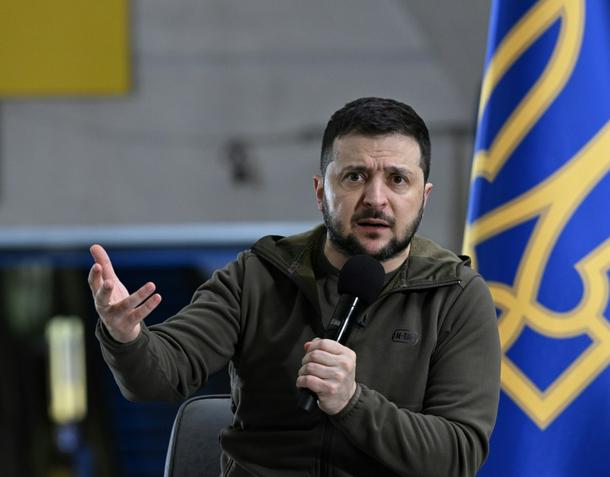
A series of European leaders have already travelled to Kyiv to meet President Volodymyr Zelensky and underscore their support, but the United States -- a leading donor of finance and weaponry -- had not sent any top officials so far
Kyiv (Ukraine) (AFP) - The United States’ top diplomat and defence chief were Sunday set to make their first wartime visits to Kyiv since Russia invaded Ukraine two months ago, with fierce fighting casting a long shadow over Orthodox Easter.
The trip by Secretary of State Antony Blinken and Defense Secretary Lloyd Austin comes as the war enters its third month with thousands dead and millions displaced.
A series of European leaders have already travelled to Kyiv to meet President Volodymyr Zelensky and underscore their support, but the United States – a leading donor of finance and weaponry – had not sent any top officials so far.
Blinken and Lloyd’s arrival in Ukraine was set to coincide with Easter celebrations in the largely Orthodox country.
“Our souls are filled with fierce hatred for the invaders and all that they have done. Don’t let rage destroy us from within,” said President Volodymyr Zelensky in a statement to mark the holiday.
Hours earlier, the president he was preparing for “important talks with American partners”. The State Department declined to comment on the highly sensitive trip by two of President Joe Biden’s top cabinet members.
Their visit comes as Russian forces show no sign of easing their attacks after a missile strike on the southern city of Odessa that killed eight people, including an infant.
“Among those killed was a three-month-old baby girl. How did she threaten Russia? It seems that killing children is just a new national idea of the Russian Federation,” Zelensky said.
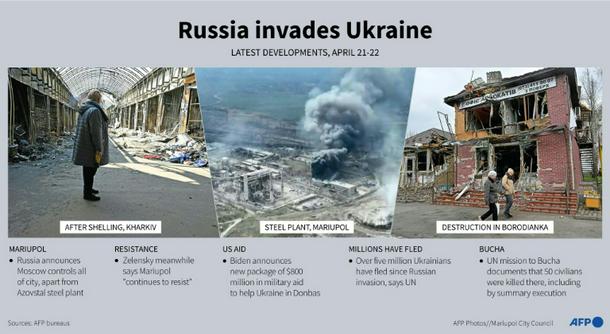
Latest developments in Russia's war with Ukraine, with photos
He also accused Russia of being a terrorist state and of acting like Nazis in the shattered port city of Mariupol, which has been devastated by weeks of intense bombardment.
- Offer to meet Putin -
The latest of many attempts to evacuate civilians from Mariupol failed Saturday, and an embattled unit of Ukrainian fighters holed up in tunnels under the sprawling Azovstal steel mill there appeared in increasingly desperate straits.
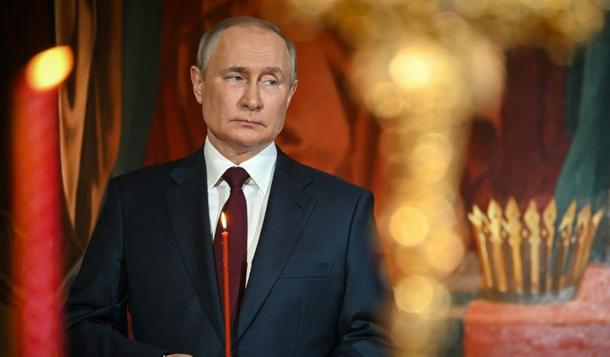
Zelensky issued a new call Saturday for a meeting with his Russian counterpart Vladimir Putin 'to end the war'
Around 200 residents gathered at a designated evacuation point in Mariupol on Saturday, but were “dispersed” by Russian forces, city official Petro Andryushchenko said on Telegram, adding: “The evacuation was thwarted.”
He claimed others had been told to board buses headed to places controlled by Russia.
In a message posted on social media Sunday, Sviatoslav Palamar – deputy commander of the far-right Azov Regiment – said Russian forces continued to rain down fire on Azovstal as its troops attempted to breach the plant’s defences.
“The enemy continues air strikes, artillery from the sea… enemy tanks continue to strike and infantry is trying to storm,” said Palamar.
Mariupol, which the Kremlin claims to have “liberated”, is pivotal to Russia’s war plans to forge a land bridge to Russian-occupied Crimea – and possibly beyond, as far as Moldova.
- Easter Sunday -
And even as fighting raged across large swaths of the country, Ukrainians took time to observe a solemn Easter in the largely Orthodox country.
Under the rain at a military position in the eastern town of Lyman, on the frontline, soldiers traded the usual patriotic salutation of “Glory to Ukraine!” for the ritual “Christ has risen!”
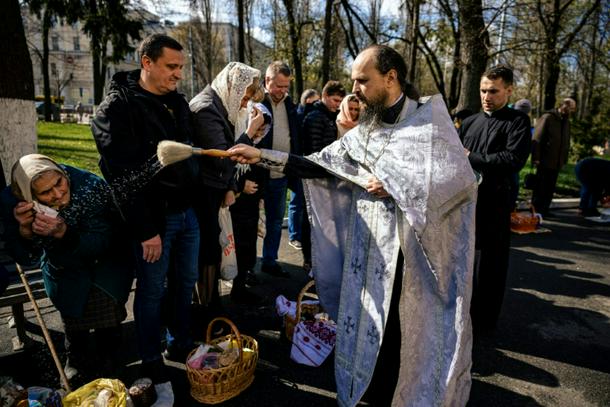
As fighting raged across large swaths of the country, Ukrainians took time to observe a solemn Easter in the largely Orthodox country
“Truly risen!” came the reply.
In the town’s small Orthodox church, around 50 civilians had braved possible mortar fire to gather to pray from dawn.
Ukrainian and Russian artillery fire could be heard throughout the singing of the psalms.
“If we make the wrong choices then darkness will ruin us, as darkness is destroying us during this war,” the priest said in his sermon.
On another part of the frontline, in the eastern city of Severodonetsk, Ukrainian troops had hidden their small stock of supplies under a bridge after they were hit by Russian mortar rounds in the night.
Along with water and Coke bottles, Kalashnikovs and cereal bars, three large Easter breads covered in icing and sprinkled with multicoloured sugar beads awaited them, after a delivery from their commander.
- Odessa missile attack -
The modest Easter celebrations came just a day after missile struck a residential building in the Black Sea port of Odessa, killing eight people and wounding at least 18, according to Zelensky, who said five missiles hit the historic city.
“We will identify all those responsible for this strike; those responsible for Russia’s missile terror,” he said.
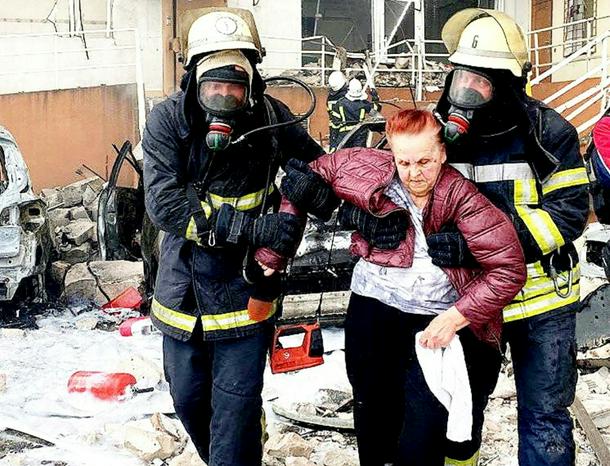
Rescuers carry a woman out of a damaged building after a missile strike in Odessa which Ukrainian authorities said killed at least eight people, including a baby, and wounded 18 others on April 23, 2022
Russia’s defence ministry said it had targeted a major depot stocking foreign weapons near Odessa, attacks that upended the relative calm the city has enjoyed since the beginning of the war.
The ministry also charged that Ukrainian special services in Odessa were preparing a “provocation with the use of toxic chemical substances” that could then be blamed on Russia.
Western powers have accused Russia in the past of making such allegations as a cover or diversion for attacks its own forces are planning.
The latest fighting followed an announcement earlier this week from a senior Russian military officer who said Moscow aimed to take full control over the eastern Donbas region and southern Ukraine.
Russian forces, who withdrew from around Kyiv and the north of Ukraine after being frustrated in their attempts to take the capital, already occupy much of the Donbas and the south.
- ‘What could be worse’ -
After changing their strategic focus to southern and eastern Ukraine, Russian forces left behind a trail of destruction around Kyiv, including in the commuter town of Bucha.
A United Nations mission to Bucha documented “the unlawful killing, including by summary execution, of some 50 civilians there”, the UN’s Office of the High Commissioner for Human Rights said.
Russian forces had “indiscriminately shelled and bombed populated areas, killing civilians and wrecking hospitals, schools and other civilian infrastructure, actions that may amount to war crimes”.
Tania Boikiv, 52, said Russian troops took her husband from their home in Bucha, held him for two weeks, then beat him to death as they retreated.
“The most terrible thing in my life is that my husband, my loved one, is gone,” she told AFP. “I don’t know what could be worse.”
burs-ds/spm